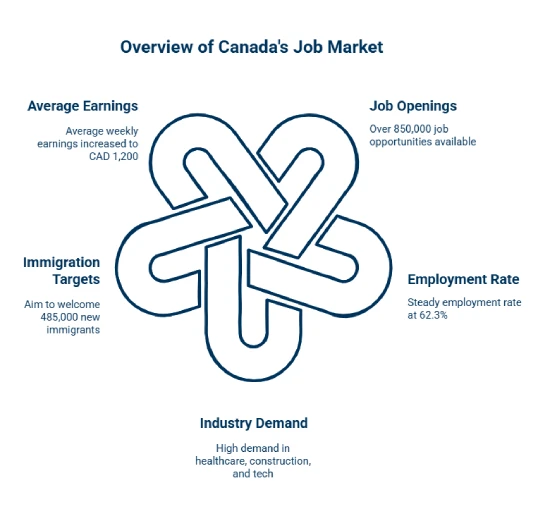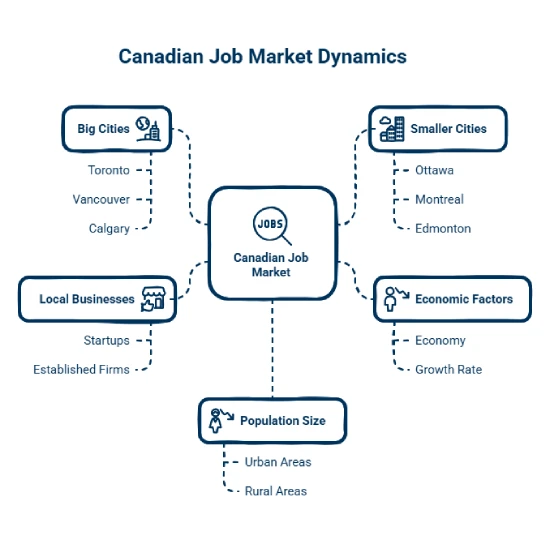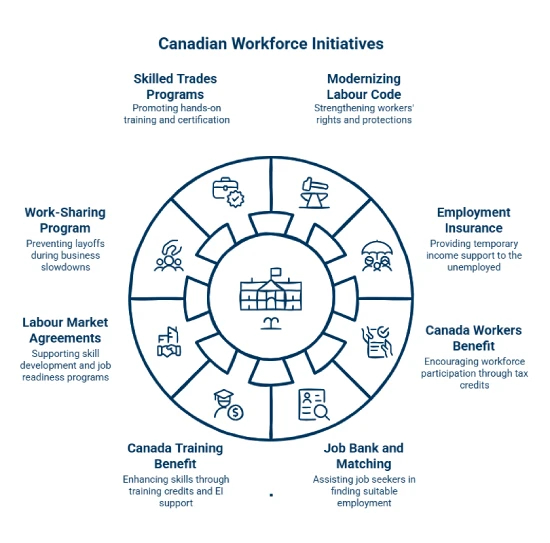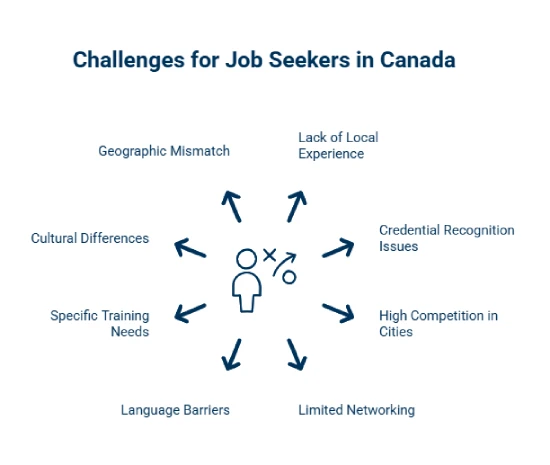
Canada's job market is strong and adaptable, thanks to population growth, changing economic conditions, and focused immigration efforts. There is a growing need for skilled workers in areas like healthcare, IT, construction, and green energy. Government actions, like raising immigration targets and putting money into infrastructure and housing, are shaping what employers need. Additionally, the rise of digital tech and the shift to remote work have created new job options. With an aging population and worker shortages in various areas, Canada is an attractive place for job seekers, both from here and abroad.
Here are some key factors shaping the Canadian job market:
*Want to work in Canada? Let Y-Axis guide you with the process.
Canada is dealing with a major labour shortage, with more than 850,000 job openings reported in early 2025. Many of these jobs are in healthcare, technology, construction, and skilled trades. Employers are looking for workers both at home and from abroad to help fill these gaps.
| Occupations | Salary |
| Engineering | $125,541 |
| IT | $101,688 |
| Marketing & Sales | $92,829 |
| HR | $65,386 |
| Healthcare | $126,495 |
| Teachers | $48,750 |
| Accountants | $65,386 |
| Hospitality | $58,221 |
| Nursing | $71,894 |
Read more…
Top in-demand occupations in Canada
The job market in Canada changes from one province and city to another, depending on factors like the economy, local businesses, and how many people live there. Big cities like Toronto, Vancouver, and Calgary offer the most job opportunities. However, smaller cities are also growing, with better opportunities and roles.

The table below has the list of the top 10 cities in Canada, along with the average salary offered and the employment growth rate:
| City | Average Annual Salary (CAD) | Employment Growth Rate (%) |
| Toronto, ON | 72,000 | 3.50% |
| Vancouver, BC | 70,000 | 3.20% |
| Calgary, AB | 75,000 | 3.40% |
| Ottawa, ON | 73,000 | 2.90% |
| Montreal, QC | 68,000 | 2.70% |
| Edmonton, AB | 71,000 | 2.80% |
| Halifax, NS | 65,000 | 3.10% |
| Saskatoon, SK | 66,000 | 3.00% |
| Winnipeg, MB | 64,000 | 2.60% |
| Kitchener-Waterloo, ON | 69,000 | 3.30% |
Canada's job market is changing and now values both technical skills and soft skills. As industries focus on digital growth, sustainability, and staying competitive worldwide, employers want workers who have the latest skills.
Here's a table with the in-demand skills that can help you fit into the Canadian job market:
| Technology Skills | Marketing Skills | Finance & Accounting Skills | Healthcare Skills | Leadership & Communication Skills |
| Cloud Computing (AWS, Azure) | Digital Campaign Management | Financial Reporting | Patient Care & Nursing Procedures | Strategic Decision-Making |
| Cybersecurity | SEO/SEM Optimization | Budgeting & Forecasting | Electronic Health Records (EHR) | Team Leadership |
| Data Analytics & Power BI | Social Media Analytics | Taxation & Compliance | Diagnostic & Lab Testing Skills | Verbal & Written Communication |
| Software Development (Java, Python) | Brand Management | Risk Management | Emergency Care & Response | Conflict Resolution |
| DevOps & Agile Methodologies | CRM Tools (HubSpot, Salesforce) | Auditing & Internal Controls | Medical Administration | Cross-Cultural Communication |
Remote work has really changed the job situation in Canada. Around 20% of Canadians are working from home, a big jump from the 4% we saw before the pandemic. Jobs in sectors like IT, finance, education, and marketing have picked up on this trend the most. In big cities like Toronto, Vancouver, and Montreal, people are leaning towards hybrid and remote work, and many companies are adjusting how they operate to make this possible.
The Canadian government and provincial labour departments have stepped in to make sure remote workers are protected, focusing on fair pay, better work-life balance, and online safety. Job ads featuring remote positions have gone up by 28% compared to last year, showing that employers are tuning in to what candidates want. For those looking for flexible work options and a chance to tap into job markets at home and abroad, Canada is a top spot for remote work opportunities.
*Want to migrate to Canada? Sign up with Y-Axis for complete immigration assistance!
The Government of Canada has rolled out several policies and programs to help boost workforce participation and improve job conditions for both workers and employers. The goal is to create fair workplaces, ensure decent wages, keep workers safe, and offer training and career growth, especially as jobs change with new technologies and trends.
Here are some key initiatives for employees in Canada:

Canada offers employee benefits that look after the workers’ health, financial stability, and general well-being, helping them maintain a good quality of work-life across the country.
Here are some of the key employee benefits in Canada:
Canada's job market has plenty of opportunities in areas like healthcare, IT, finance, and skilled trades. But job seekers, especially newcomers and recent grads, might face some bumps on their path to finding work. Knowing these challenges can help in getting ready and improving chances of getting hired.
Here are some common hurdles job seekers run into in Canada:

Canada has a lively job market with many opportunities in different fields. For newcomers, finding a job takes some prep, flexibility, and knowing what the local hiring scene looks like. By following some smart steps, job seekers can improve their chances and fit into the Canadian workforce more easily.
Here are some of the tips you can follow if you plan on working in Canada:
*Finding it difficult to keep your resume up-to-date? Avail Y-Axis Resume Writing Services to get personalized assistance!
Canada's job market is holding strong with steady growth in different areas. The unemployment rate is pretty low at around 6.1%, making it a great spot for skilled workers, particularly in healthcare, tech, construction, and finance. Statistics Canada reports that there are more than 700,000 job openings across the country, showing a solid demand from employers.
Immigration is a big part of building the workforce, with over 60% of new permanent residents coming through economic immigration programs. Cities like Toronto, Vancouver, Calgary, and Ottawa have good job rates and decent pay, while remote and rural areas are seeing more openings in education, trades, and healthcare.
*Are you looking for step-by-step assistance with Canada Immigration? Contact Y-Axis, the leading visa and immigration consultancy in Canada!
Explore what Global Citizens have to say about Y-Axis in shaping their future
Canada PR Visa
Sameer got Permanent Resident Visa for C
Read More...
Canada Work Permit Visa
Varun provided us with great Y-Axis Revi
Read More...
Canada PR Visa
One of our client Virendra availing his
Read More...
Looking forward, Canada's job scene is likely to grow steadily. From 2023 to 2025, we expect to add over 250,000 new jobs, especially in fast-growing fields like tech, education, and healthcare. Plus, the government's push for infrastructure and renewable energy projects should bring in more job opportunities.
One of the most wanted jobs in Canada is Registered Nurse (RN). The healthcare system is having a hard time keeping up due to an aging population and more medical needs. Because of this, nurses are in high demand all across the country. Registered Nurses fall under the National Occupation Classification (NOC 31301) and can apply through Canada's Express Entry and Provincial Nominee Programs. There are plenty of job openings, and salaries are pretty good, ranging from CAD 80,000 to CAD 100,000 a year. This job also provides a solid way for foreign workers to gain permanent residency.
The job market in Canada appears stable, with a participation rate of 67.0% as of May 2025. Full-time jobs are on the rise, reflecting a strong demand for skilled labour. Still, some economists point out that the momentum from government jobs might be slowing down, suggesting we need more growth from the private sector.
The most sought-after jobs in Canada for 2025 are:
Note: These positions often come with good pay and chances to move up in your career.
As of 2025, the average full-time salary in Canada is around CAD 103,000, showing a small rise from last year due to inflation and market changes. The pay can vary depending on the industry, experience, and where you work, with tech, engineering, and healthcare typically offering higher salaries.
Recent trends show a slight drop in total employment numbers in May 2025, but full-time jobs are going up, and the unemployment rate remains stable at 4.1%. The Reserve Bank of Canada forecasts the unemployment rate might hit 4.3% by the end of the year, indicating the job market is still holding strong.
Absolutely, the job market in Canada today has plenty of openings, especially in areas facing skill shortages. With steady unemployment and high demand in healthcare, tech, and construction, job seekers with the right skills should find good opportunities. Plus, the government’s skilled migration program is making it easier for qualified professionals to enter the job market.
Foreign workers are really important for Canada’s job market. Data shows that foreign employment is on the rise, especially in healthcare, IT, and engineering. The skilled migration program has helped boost workforce numbers, with foreign worker growth rates of 15% in healthcare, 22% in IT, and 18% in engineering.
Healthcare, technology, construction, finance, and green energy are among the sectors showing strong hiring activity across the country.
Employers are seeking professionals with expertise in data analytics, cybersecurity, project management, AI, healthcare, and skilled trades.
Toronto, Vancouver, Calgary, Ottawa, and Montreal are leading cities for job growth, particularly in tech, finance, and healthcare industries.
Foreign workers commonly apply under programs such as the Temporary Foreign Worker Program (TFWP), International Mobility Program (IMP), or Express Entry for permanent residency.
Applicants can search through Canadian job portals like Job Bank, Indeed, and LinkedIn, or apply directly to employers with LMIA (Labour Market Impact Assessment) approval.
Jobs in nursing, software development, renewable energy, construction trades, and logistics are expanding rapidly due to demographic and economic trends.
Ontario and British Columbia have higher living costs, while Alberta, Manitoba, and Atlantic provinces offer more affordable living with growing job prospects.
Canadian workplaces emphasize inclusivity, respect, teamwork, and work-life balance. Flexible and hybrid working arrangements are increasingly common post-pandemic.
Common challenges include credential recognition, lack of Canadian work experience, and competition in urban centers — though settlement programs and bridging courses help.
Obtaining Canadian-recognized certifications, improving English or French proficiency, networking, and applying through immigration pathways like Express Entry improve employability.